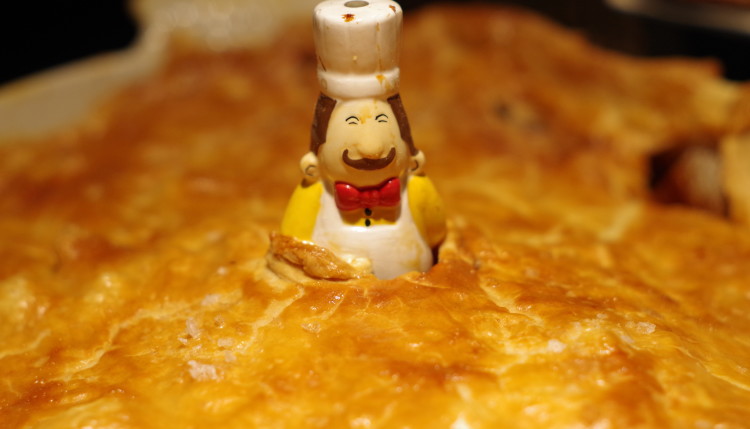
Kitchen Coach
Recently on the radio, I heard Mark Bittman, former lead food columnist for The New York Times Magazine. He was talking candidly and frankly about himself, his new business venture, and the state of things food related in the world. He said something that got me thinking. Now, I may misquote exactly what he said, but the sense of it was “all the TV shows on the Food Network have taught more people about food, but they don’t encourage them to cook.”
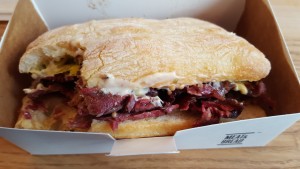 This wasn’t something I had really considered before and I knew it instantly to be true. I have lengthy conversations about food shows with friends. I see people Instagram every morsel they put in their mouths. But getting these people in the kitchen – and in the kitchen trying new things – is not common at all.
This wasn’t something I had really considered before and I knew it instantly to be true. I have lengthy conversations about food shows with friends. I see people Instagram every morsel they put in their mouths. But getting these people in the kitchen – and in the kitchen trying new things – is not common at all.
We live in a remarkable time, food wise – and some of this Mark Bittman talked about. We grew up eating what our moms cooked for us, and they grew up eating what their moms cooked for them. In my world this was translated to a meat, a potato, and a vegetable.
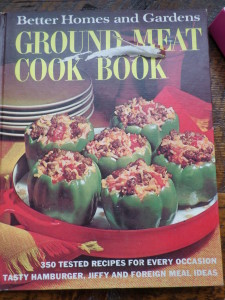 Sure, sometimes there was lasagna, or spaghetti, but the recipes came from tried and true sources (Betty Crocker, Better Homes and Gardens, or Kraft packaging). And there’s nothing wrong with that. The difference is that today you can access recipes and instructional videos on cuisines from all over the world in seconds. You can find relatable cookbooks from parts of the world you never knew existed with helpful substitutions for hard to find ingredients.
Sure, sometimes there was lasagna, or spaghetti, but the recipes came from tried and true sources (Betty Crocker, Better Homes and Gardens, or Kraft packaging). And there’s nothing wrong with that. The difference is that today you can access recipes and instructional videos on cuisines from all over the world in seconds. You can find relatable cookbooks from parts of the world you never knew existed with helpful substitutions for hard to find ingredients.
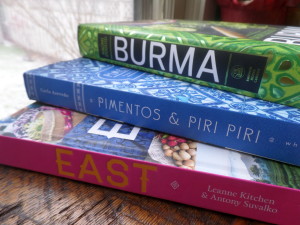
So, how do you motivate non-cooking people to start cooking?
In theory, the TV shows should be pretty motivating, right? Beautiful people who are usually passionate and largely skilled. The food looks amazing, the instructions are clear…so, what’s the problem???
I remember watching Anna Olson make croissants on tv once (here’s the video). She implied it would be easy. And she did lots of variations – Almond croissants, cheese croissants, pain au chocolate, and at the end a chocolate croissant bread pudding. Easy, right? Wrong. Through the magic of tv she got all this done in a 22 minutes. Her apron and shirt remained clean. Dishes didn’t stack up. Everything was on hand and measured. Anna was a great teacher and I have no fault with her – in fact, I’m a huge fan! – but the magic of tv makes it all seem a little unrealistic. I have since made croissants – and they were delicious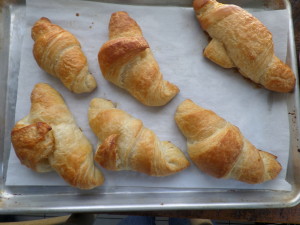 , BUT it took me 2 days, I was covered in butter and flour, my kitchen counter was a mess, and the sink was full of dirty dishes. In all honesty, my deciding factors when making croissants are 1)will I be home for the next few hours to laminate the dough? 2) is there room in the fridge for the dough to rest overnight? 3) do I care if I ruin these clothes? And 4) do I really have that level of clean up in me today? And this is me. I do measure my ingredients out ahead of time and I likely have everything on hand. What if I didn’t??
, BUT it took me 2 days, I was covered in butter and flour, my kitchen counter was a mess, and the sink was full of dirty dishes. In all honesty, my deciding factors when making croissants are 1)will I be home for the next few hours to laminate the dough? 2) is there room in the fridge for the dough to rest overnight? 3) do I care if I ruin these clothes? And 4) do I really have that level of clean up in me today? And this is me. I do measure my ingredients out ahead of time and I likely have everything on hand. What if I didn’t??
Baking and cooking take preparation. They take kitchen organization.
I’ve noticed that when people ask me how to cook or bake something and I begin my explanation with “Using a (kitchen tool) do X,” they stop me and ask about the tool. What is it? What can they use instead? An amazing woman I used to work with would often ask for substitutions for ingredients or tools because she didn’t have them on hand. Sometimes it is completely doable. Sometimes it’s not. And how are you to know? And if you make a mess and waste a lot of money, how are you motivated to try again?
Maybe we’ve been going about this all wrong. Maybe we need to go back further than recipes and flashy tv shows. Maybe we need to start examining the tools and ingredients. What you need on hand and why. I’ve often thought that I would love to be a kitchen coach – go into people’s kitchens, see what they have, discover what they need, and organize it in a way that makes it easier to co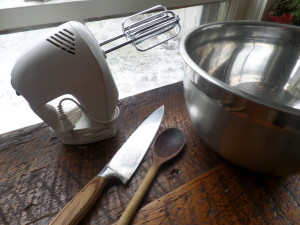 ok. And this doesn’t mean spending a lot of money on fancy gadgets and appliances. For many years my only electric mixer was a cheap handheld, and I only broke down and bought a food processor a few years ago. A wooden spoon, a good knife, and a big bowl can often be enough. Maybe that would help to motivate people…
ok. And this doesn’t mean spending a lot of money on fancy gadgets and appliances. For many years my only electric mixer was a cheap handheld, and I only broke down and bought a food processor a few years ago. A wooden spoon, a good knife, and a big bowl can often be enough. Maybe that would help to motivate people…
What about you? What stops you from cooking?
What motivates you? When you don’t have a tool on hand, do you substitute? Pick another recipe? Or walk out of the kitchen altogether? This is what I want to know. And maybe…I can help. Kitchen Coach to the rescue!
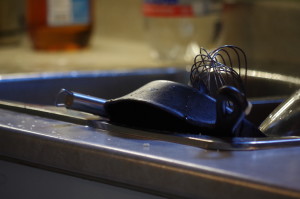
Amanda Leigh March 29, 2016 - 5:04 pm
When I read a recipe I often see an ingredient I’m not familiar with or a term that scares me and that’s enough to put me off. And I get stressed so easily. I am slowly beginning to build my confidence though. Up until about two years ago (you work out the timing!) I had never had someone say they liked my cooking. In fact, there was a lot of criticism instead. It was a huge step for me to have a friend over for dinner. I made her a pesto dish and it was delicious and she TOLD me it was delicious and it was the BEST feeling in the world. So maybe I’m not as bad in the kitchen as I’ve led myself to believe.
Amy March 29, 2016 - 5:27 pm
That’s a great point, Amanda. Positive reinforcement is key. It’s important in all adult learning. We get so focused on criticism that we forget about praise – criticism from others and ourselves. The terms can be easily learned, if they are well explained. So often they aren’t – which is what creates the fear. I’m happy to answer any questions you have any time you have them. Maybe we could cook together one day soon…? Thanks for reading, and for writing!